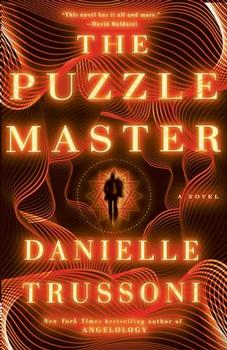Summary | Excerpt | Reviews | Beyond the Book | Readalikes | Genres & Themes | Author Bio

A Novel
by Danielle TrussoniExcerpt
The Puzzle Master
December 24, 1909
Paris, France
By the time you read this, I will have caused much sorrow, and for that I beg your forgiveness. As you know, my child, I am a haunted man, and while the toll has been steep, I have at last made peace with my demons. I do not write this as an excuse for what I have done. I know too well that there is no forgiveness for it—not in the eyes of God or man. But rather, I write this account of my discovery out of necessity. It is my last chance to record the incredible events, the terrible and wonderful events, that changed my life and will, if you venture into the mysteries I am about to relate, change yours, as well.
What, you ask, is responsible for such torment? I will tell you, but take heed: Once you know the truth, it is not easily forgotten. It has haunted me every minute of every day. There was no question of ignoring it. I was drawn to its mystery like a moth circling a flame—In girum imus nocte et consumimur igni. And while I am fortunate to have survived to record the truth, even now, as I stand on the edge of the abyss, I cannot help but shrink at the thought of entrusting such a dangerous secret to you.
I have suffered, but it is the suffering of a man who has created his own torture chamber. I believed I could know what shouldn't be known. I wanted to see things, secret things, and so I lifted the veil between the human and the Divine and stared directly into the eyes of God. That is the nature of the puzzle: to offer pain and pleasure by turns. And while the truth I am about to reveal may shock you, if it offers some small refuge of hope, then this, my last communication, will achieve all it must.
June 9, 2022
Ray Brook, New York
Mike Brink turned down a country road, drove through a dense evergreen forest, and stopped before the high metal gate of the prison. His dog, a one-year-old dachshund called Conundrum—Connie for short—slept on the floor of the truck, camouflaged by shadows. She was so still that when the security guard stepped to Brink's truck and peered inside, he didn't see her at all. He merely checked Brink's driver's license against a list and waved him toward an imposing brick institution that seemed better suited to a horror movie than the bright June sunshine.
Mike Brink had an appointment with Dr. Thessaly Moses, the head psychologist at the New York State Correctional Facility, an all-women's minimum-security prison in the hamlet of Ray Brook, New York. She'd called him the week before and asked him to come to the prison to speak with her. One of the prisoners had drawn a perplexing puzzle, and she wanted help making sense of it. Because of his work as a puzzle constructor and his fame after Time magazine christened him the most talented puzzleist in the world, thirty-two-year-old Mike Brink was barraged with puzzles. Most of them he solved in an instant. But from Dr. Moses's description, this puzzle sounded peculiar, unlike any puzzle he'd seen before. When he asked her to take a photo and email it, she said she couldn't risk it. Prisoner records were confidential. "I shouldn't be discussing this with you at all," she said. "But this is a unique patient, one who's become rather important to me." And so, despite his deadlines and the three-hundred-mile drive, Mike Brink agreed to come upstate to see it. Puzzles were his passion, his way of making sense of the world, and this was one he couldn't resist.
The prison was ominous, with steeples and dark, narrow windows. When he'd read up on its history, he found that it was built in 1903 as a sanatorium for the treatment of tuberculosis. The clean air, high altitude, and endless forests had been an integral part of the cure. The institution's one claim to fame was its appearance in Sylvia Plath's The Bell Jar. Plath had visited her boyfriend while he was recovering from tuberculosis at the facility and then repurposed the sanatorium in her fiction. Now the facility housed hundreds of female inmates. From the parking lot he saw a yard enclosed by a chain-link fence topped with razor wire and, beyond, a modern cinder-block addition, its severity a startling contrast to the Gothic excesses of the original building. Surrounding it all stretched an endless sea of thick evergreen forest, a natural barrier between the prisoners and the rest of the world. He imagined that such isolation was intentional: Even if a prisoner made it over the fence, even if she got free of its twists of razor wire, she would find herself in the middle of nowhere.
Excerpted from The Puzzle Master by Danielle Trussoni. Copyright © 2023 by Danielle Trussoni. All rights reserved. No part of this excerpt may be reproduced or reprinted without permission in writing from the publisher.
When all think alike, no one thinks very much
Click Here to find out who said this, as well as discovering other famous literary quotes!
Your guide toexceptional books
BookBrowse seeks out and recommends the best in contemporary fiction and nonfiction—books that not only engage and entertain but also deepen our understanding of ourselves and the world around us.